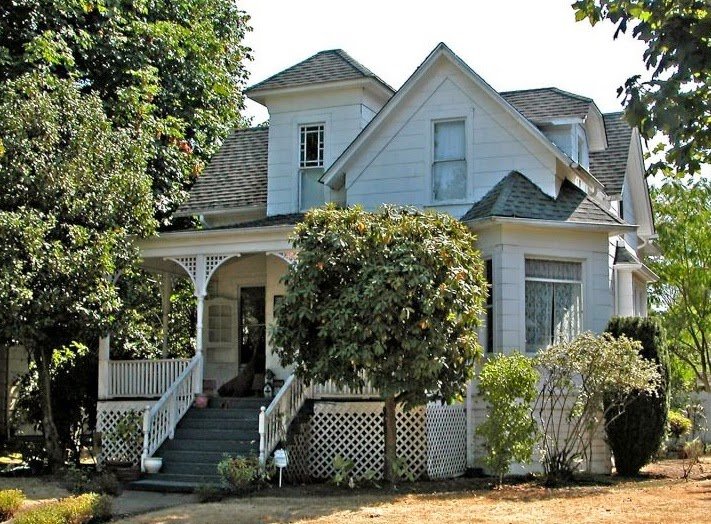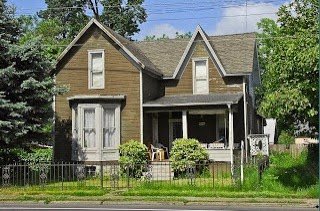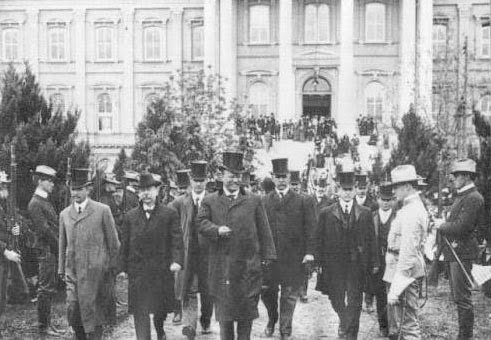World Events
- With U.S. encouragement, Panama proclaimed independence from Colombia. Several different treaties between U. S. and Columbia (and then Panama) in what was called “gunboat diplomacy” were necessary until U. S. had the authority to build a canal across Isthmus of Panama. (Roosevelt’s popularity leads to toy bear being called the “Teddy Bear”.)
- Cuba leases Guantanamo Bay to U. S. “in perpetuity”.
- The Russian Social Democratic Labor Party splits: Bolsheviks (Russian word for “majority”) and Mensheviks (“minority”).
- The Wright Brothers make the first successful petrol-powered, heavier-than-air flight at Kitty Hawk, North Carolina.
- The first Tour de France bicycle race is won by Maurice Garin. In the first World Series, the Boston Red Socks defeat the Pittsburgh Pirates in 8 games. The first stock car event is held at the Milwaukee Mile.
- Crayola crayons are introduced, 8 colors in a box for 5 cents.
- Best New American Books: Call of the Wild, Jack London and The Ambassadors, Henry James. For children: Rebecca of Sunnybrook Farm, Kate Douglas Wiggins.
In Salem
The city welcomes President Roosevelt who speaks to our Legislature in the State House. In this photograph he is leaving as a group of top-hatted gentlemen walk along, Governor Chamberlain to his right. The local star of the day was our own soprano, Hallie Parrish Hinges, who sang the National Anthem for the thousands who were present to hear his speech. Her clear soprano, it was reported, could be heard as far away as the top of High Street hill eleven blocks away. President Roosevelt said to Governor Chamberlain, “She has one of the most beautiful voices I have ever heard. Have her sing again.” Hallie responded by singing a favorite of the time, “The Flag Without a Stain,” and soon the president wiped his eyes, asked for her name and said, “Truly, she is the Oregon Nightingale.” This was the second time Hallie had sung for a president: she performed for Benjamin Harrison in 1891. In 1911, she gave her third presidential performance. Standing beside William Howard Taft in an open, touring car (surrounded by secret service men), she led a group of school children in serenading the top-hatted president on Court Street.
Mrs. Hinges was the granddaughter of Josiah Parrish, a Methodist missionary pioneer of the “Lausanne” party of reinforcements in 1840. He was noted for his work among the Indians to whom he was known as “the man of peace”. He was awarded the one-mile square donation land grant that was the northeast section of the four-mile Salem distribution. The Lee Memorial Cemetery, where many pioneers are buried, was begun by his family on their land. His 1860s Capitol Street home (across from the school that honors his memory) was relocated to the A. C. Gilbert Discovery Village on Water Street in 1990 due to the construction of the Oregon State Archives. Hallie’s parents were Norman O. Parrish and his wife Henrietta. She married Dr. Charles H. Hinges and had two children, Karl and George.
When you visit
If the popular “Teddy” left any other memento of his visit except this photograph, none is known. The State House burned in 1935 and has been replaced by a modern structure, unlike this classic building.
Governor Chamberlain, whose wife did not wish to leave her home in Portland, rented a room in the Cooke-Patton mansion across the street, now the site of the Oregon State Library. He resigned in 1909 when elected to the US Senate.
Long a favorite performer at Oregon vocal events, Hallie Hinges died in 1950 at the age of 82. A home associated with her family (and later Samuel Kimball) was at the SW corner of Chemeketa and Summer Streets. In 1938 it was removed due to construction for the State Library. It has since moved twice due to the expansion of the North Capitol Mall and is now at 1075 Capital Street, NE.
Other events
- The city grows for the first time since its incorporation: annexations include all of the present Grant neighborhood, the south half of Highland, almost all of NEN, SESNA to about the present Airport Road to the east and SCAN to Rural Street on the south. The 5th, 6th and 7th wards are added, bringing the number of Aldermen to 14, two for each ward.
- The first Cherry City parade is organized, sponsored by the Elks Club. Its lodge hall was the State Street structure that is now the Micah Building of the United Methodist Church. Agnes Gilbert was named Cherry Festival Queen. Fifty-three years later, as Mrs. B. O. Schucking, she became Salem’s First Citizen.
- A public library committee is formed with the first collection of books in a room of the City Hall.
- The Queen Anne-styled Ada and Mark Skiff Block, just east of Liberty on Court Street, is completed. It will be used as commercial shops and offices, but not for the Skiff family. Dr. Lansing F. Skiff was one of the first dentists in the Far West, a so-called “circuit rider” of dentistry. He was also one of the first dentists in the United States to use a water motor in the in cleaning teeth. He founded the Oregon State Dental Society. His son, Mark, followed in this profession and reportedly set the first gold crown in Salem. Neither dentist practiced in the building. It is included in the SHINE Downtown walking tour.
 |
| Cole-Jewett House |
- At 1020 16th Street, a Queen Anne residence is built, probably by Vincent Cole. In 1911, the large, many gabled residence was purchased by George and Hattie Jewett who lived there for forty years with several other adults of their family. After the mid-forties, the property was subsequently sold to a succession of owners: Thomas and Frances Moisan, Mrs. Stella Ashton and Arnold and Mary Unger. Well maintained with its original architectural integrity, it stands in a mature landscape with other houses of similar age. It is an outstanding local Landmark in the NEN neighborhood.
 |
| Mystery House moved from Ferry Street to 17th in 1903 |
- Another residence is moved in that neighborhood: from Ferry Street (directly behind the Methodist Church) to 17th Street. north of Mill Creek. A few years ago, a lady came to the house and said she (or perhaps her relatives) had lived in the house after its relocation here in 1903 when the owners placed it here and sub-divided the several acres around it ~ constructing the street that runs along the north side of the creek and selling lots for other houses.
We hope the owner will continue research so we may learn the names of earlier owners of this house and its history. This may be the oldest residence in Salem. - South of the city, in the Ewald Fruit Farms (now 3915 Liberty Street South), a hilltop farmhouse is built among the orchards. It may have been on the Chapman land in the 1920s, but 1951 was the home of Robert D. Taylor and his wife Hope. He was president of the Salem Brake and Wheel Alignment Company. By 1976, he had retired and this was the last year his name appeared at this address. No other research has been done on this house that is now a rental.
- The first automobile, an Oldsmobile, is brought to Salem by Otto J. Wilson.

